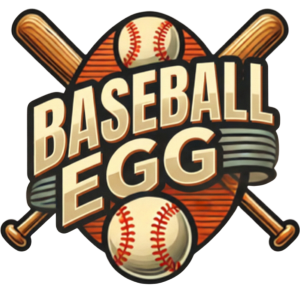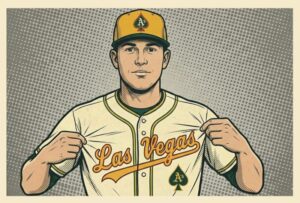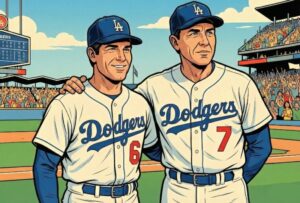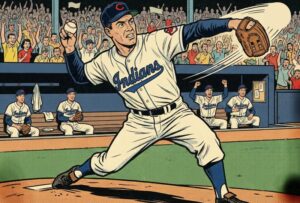One of the problems of being really good when you’re young is that expectations are set very high. That’s what happened to Mike Trout. He had arguably the best first five seasons of any position player, all before his 25th birthday. But now, as he navigates his 30s, the outfielder is facing the reality of being human.
But that’s not all that plagues Trout.
Trout is hard to define as a superstar. He’s definitely super. But is he a star?
Trout has become more famous for what people say he is capable of, than what he’s actually done (which is still significant).
Former Angels general manager Tony Reagins, who was at the helm of the franchise when the Halos selected Trout in the first round of the amateur draft in 2009, predicted record-setting numbers. Reagins speculated that Trout could one day hit 50 home runs and steal 50 bases.
After Trout batted .324 in his first two full seasons, experts predicted he would win the elusive triple crown. He might five, six, or even seven MVPs, they said. But instead, Trout kept doing more than enough to be the darling of Sabermetric fans, without ever having that remarkable signature season.
What is Mike Trout’s magnum opus?
When he was 20, Trout led the league in steals. When he was 23 he led the league in slugging. When he was 24 he won his third MVP award. BY age 27 he had 285 home runs and was practically half-way to 3,000 hits.
Yet, Trout never has gone 50/50. In fact he’s never even gone 30/30. He’s never won a Gold Glove. Annually, when healthy he’s among the leaders in on-base and slugging, but outside the nerds who love WAR, where’s the super season? Trout isn’t “The Kid” or “The Say Hey Kid,” he’s “Mr. Percentage.”
In decades past, Sports Illustrated would publish feature articles on the greatest athletes of their times: Joe DiMaggio, Mickey Mantle, Willie Mays. Those articles would illuminate the unparalleled greatness of those ballplayers. In January this year, Sports Illustrated ran a story on Trout centered on the fact that he has an OPS of 1.002, a stellar number, but hardly the type of thing to sell jerseys and cement greatness.
When people spoke of Ken Griffey Jr. as a generational player, it wasn’t his OPS+ or his on-base percentage. It was his swing, his backwards cap, his smile. Griffey transcended baseball and became an athlete for the ages. Trout, for all his talent and production, fails that test.
Bland in an Age of Social Media
It’s not his fault, but Trout isn’t representative of the era he plays in. In an age of social media, short highlight clips, and back slapping moments in All-Star games, Trout is the guy sitting off to the side, draped in greatness, but plagued by blandness.
Baseball in the 2020s is pimping home runs. It’s big smiles during the home run derby. It’s huge moments in the postseason. It’s flash and drip and bling.
Juan Soto does his two-step after nearly every pitch, and adds a swagger. Ditto Julio Rodriguez, and Bryce Harper, who has surpassed Trout as the superstar of his generation. Harper is dynamic, while Trout seems utilitarian.
Mike Trout is a 1950s player stuck in the 21st century.
Trout is boring. He likes country music, and typically defers to others in the clubhouse as leaders of his team. He likes to think of himself as an underdog, which undercuts his status as a superstar. Trout once explained that he would prefer to beat out a chopper to shortstop than hit a screaming line drive to the outfield. He’s not a bat flipper, a thrilling highlight reel player. He’s a double here, a walk there, a home run over there. At the end of the year he has numbers and the all0important percentages and WAR, but does anyone remember anything noteworthy about any of his seasons?
Even Trout’s accomplishments are tied to his limitations. In 2022, hampered again by an injury, Trout was shelved for weeks. Still, he became just the sixth player in MLB history to hit 40 or more home runs in 120 or fewer games in a season. But “records” like that elicit more of a yawn than awe. Trout drove in 80 runs, and his team won 73 games and missed the playoffs. A highlight reel of his 2022 season would be 95% home run swings. So, has he become Aaron Judge?
Trout will need to hit 35 home runs a season through the age of 42 just to reach Hank Aaron, Barry Bonds territory. That’s if he can stay healthy (a broken bone in his hand will sideline him until September this year).
And what if Trout does challenge the home run record? If the longball becomes his MO the last decade-plus of his career, where is his stature for a comparison to Mays? Willie was a stellar center fielder into his late 30s. He was one of the best baserunners in the game. Trout basically stopped stealing bases when he was 27. Since 2019, Trout has attempted to steal only seven bags.
Dimmed in the Shadow of Ohtani
How can Trout be the greatest player of his generation if he isn’t the best player on his own team? Shohei Ohtani has surpassed Trout in every way. The Japanese two-way player is a mega superstar on a different plateau than anyone in his sport.
Trout will be 38 years old when his current contract expires after the 2030 season. Who knows what type of player he’ll be by then. Father Time is undefeated, and he’s been smacking Trout around a little bit even in his early 30s.
There’s no doubt Trout is a future Hall of Famer. He had as productive an eight-year stretch in his 20s as any ballplayer ever. But, as Gertrude Stein famously said of Oakland, “there’s no there there.” What should we be excited about? The churning percentage number greatness? The potential for 3,000 hits and 600 home runs? Or maybe a new home run record? Is Mike a slugger? Or is he the next Willie Mays? Is he even Mike Trout any more?





